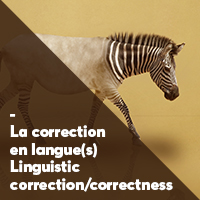Fichier joint
- Affiche colloque GREG PLS5 PDF, 322 Ko
- GREG PLS 5- Conference programme / Programme du colloque PDF, 213 Ko
- Practical information / Informations pratiques PDF, 38 Ko
Contacts
Conférenciers invités :
Jeff Tennant (Western University, Ontario, Canada)
Julien Longhi (Université de Cergy Pontoise)
Julien Longhi (Université de Cergy Pontoise)
Comité scientifique :
Remi Camus, Université Paris Nanterre
Gilles Corminboeuf, Université de Fribourg, Suisse
Claude Delmas, Paris 3- Sorbonne Nouvelle
Lionel Dufaye, Université Paris Est – Marne La Vallée
Gilles Forlot, INALCO
Eric Gilbert, Université de Caen – Basse Normandie
Alice Krieg-Planque, Université Paris Est – Créteil Val de Marne
Marie Leroy, Université Paris Descartes
Clara Lorda, Université Pompeu Fabra, Barcelona, Espagne
G. Mélis, Université Paris Diderot
Aliyah Morgenstern, Université Sorbonne Nouvelle – Paris 3
Catherine Paulin, Université de Strasbourg
Blandine Pennec, Université Toulouse Jean Jaurès
Sophie de Pontonx, MoDyCo
Graham Ranger, Université d’Avignon
Françoise Sully-Nylander, Université de Stockholm, Suède
Anne Trévise, Université Paris Nanterre
Sarah de Vogüe, Université Paris Nanterre
Gilles Corminboeuf, Université de Fribourg, Suisse
Claude Delmas, Paris 3- Sorbonne Nouvelle
Lionel Dufaye, Université Paris Est – Marne La Vallée
Gilles Forlot, INALCO
Eric Gilbert, Université de Caen – Basse Normandie
Alice Krieg-Planque, Université Paris Est – Créteil Val de Marne
Marie Leroy, Université Paris Descartes
Clara Lorda, Université Pompeu Fabra, Barcelona, Espagne
G. Mélis, Université Paris Diderot
Aliyah Morgenstern, Université Sorbonne Nouvelle – Paris 3
Catherine Paulin, Université de Strasbourg
Blandine Pennec, Université Toulouse Jean Jaurès
Sophie de Pontonx, MoDyCo
Graham Ranger, Université d’Avignon
Françoise Sully-Nylander, Université de Stockholm, Suède
Anne Trévise, Université Paris Nanterre
Sarah de Vogüe, Université Paris Nanterre













